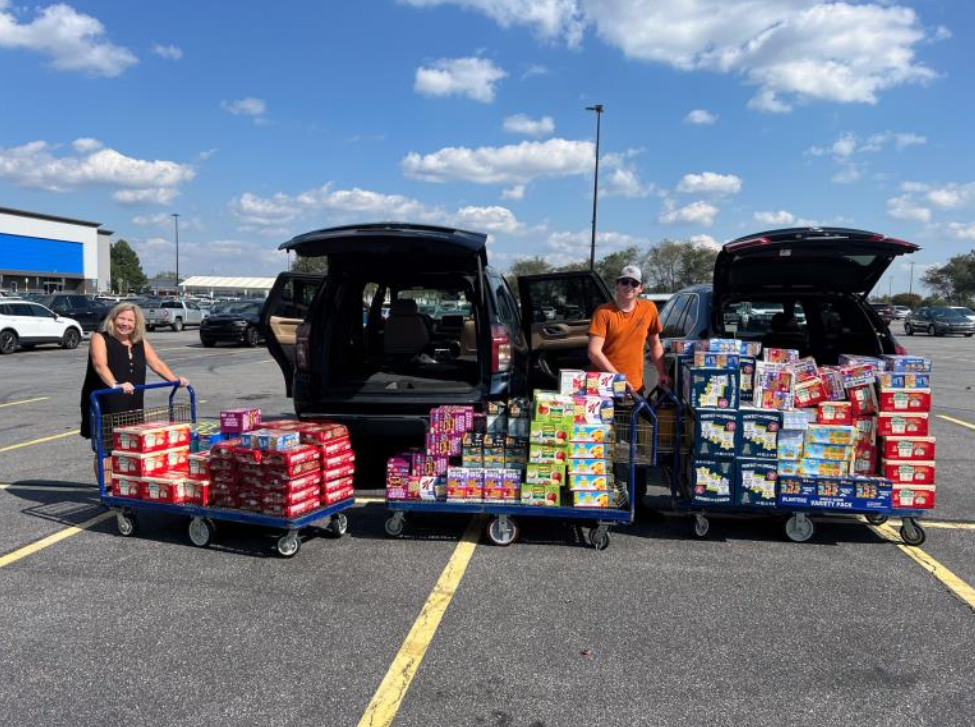Impact Health – When a network forms a safety net Hurricane Helene Grantee Spotlight
In the weeks following Hurricane Helene, Dogwood invested more than $70 million in relief and recovery grants to strategic partners across Western North Carolina. As the region marks six months since the storm, Dogwood is proud to highlight the work of Impact Health, which helps community members in Western North Carolina access nutritious food, stable housing, reliable transportation, and healthy relationships – the building blocks for better health.
Impact Health was uniquely positioned to rapidly engage organizations across the region in Hurricane Helene recovery efforts, thanks to the network of Health Serving Organizations that are part of the Healthy Opportunities Pilot (HOP) network that Impact Health manages in WNC. HOP provides nonmedical services to eligible NC Medicaid members at no cost to address needs related to fresh food, safe housing, reliable transportation and personal safety.
“There were two levels to our response: relational and logistical,” said Laurie Stradley, Impact Health’s CEO. “Because of our relationship with Dogwood Health Trust and our 60-plus agencies already active in damaged communities, we didn’t need to vet anyone. We know they’re solid because we’ve worked with them. These established relationships also meant we knew how to reach people even when cell service and internet was down.”
Impact Health was able to swiftly distribute Dogwood funding to its HOP agencies. Funds enabled these partners to respond to the region in a variety of vital ways such as supporting area farmers, hiring tradespeople to repair hurricane-damaged homes, and retaining staff at a time when many WNC residents found themselves suddenly unemployed. In the immediate weeks following the storm, Impact Health distributed $670K to 67 partner organizations working directly with individuals and families severely impacted by the storm.
For example, in Burke County, HOP partner C2Life Foundation used their grant to feed their HOP members and many others in the area who were left without power, water or a means to communicate.
“We are grateful for the quick release of funds from Impact Health,” said Chasity Poteat Rice, CEO/Founder of C2Life Foundation. “Their support was vital to our ability to respond rapidly to the nutritional needs of our neighbors impacted by the devastation of Hurricane Helene. We already had boots on the ground doing whatever we could, but the money from Impact Health enabled us to say, ‘let’s go!’”
Meanwhile, Mother Earth Food collaborated with HOP service providers and WNC nonprofits to ensure thousands of residents had access to fresh, healthy food in the early days after the storm. This collaboration provided local farmers with buyers for their produce at a time when most restaurants and farmers’ markets— their primary income—were shut down.
Thanks to storm-related assistance, Impact Health helped partner organization Safe Shelter to stay the course in service delivery in the weeks following the storm. Before Hurricane Helene, Safe Shelter was preparing to move into its new space and expand its hours, shelter capacity, and staff. In the weeks to follow they were inundated with referrals and people showing up on their doorstep seeking refuge. The funding Impact Health provided helped them stay on track to meet the increased needs of community members recovering from this unprecedented natural disaster.
Impact Health partner Interfaith Assistance Ministry also sprang into action, quickly setting up a drive-through food distribution site, thanks to a flood of donations and volunteer support in Henderson County. Like many organizations, they tirelessly helped the community while dealing with their own losses from Helene. Many team members lacked power and water, and some lost their homes. Undaunted, they still showed up to help others.
In total, Impact Health distributed $4 million in Dogwood grant funds in phases over the final quarter of 2024. The initial two phases were largely unrestricted, allowing partner organizations the flexibility to allocate the funds where they identified the greatest need, a trust-based investment that Stradley said was vital to the region’s recovery.


